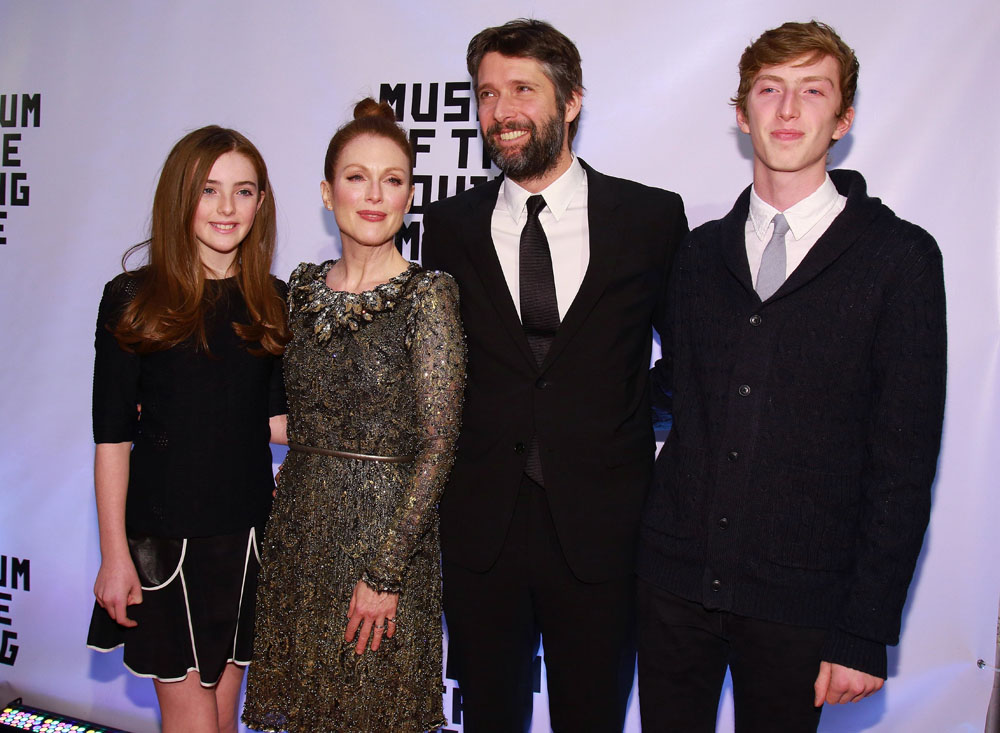
Julianne Moore is promoting Maggie’s Plan, a romcom costarring Ethan Hawke and Greta Gerwig and directed by Rebecca Miller. (Playwright Arthur Miller’s daughter!) The film was out in the US in limited release a couple of months ago but is playing in Australia now. Julianne gave an interview to the Sydney, Australia paper The Daily Telegraph and she’s surprisingly quotable here. She talks about female directors and the representation of women in film and she also discusses her teenagers, which are some of the quotes People Magazine picked up. Julianne has two teenagers with her husband of 13 years, Bart Freundlich. They have son Caleb, 18, and daughter Liv, 14. While trying to explain how her teenagers’ lives are as normal as possible, Julianne sounded somewhat out of touch to me.
Are you a big celebrator?
I’m a big believer in celebrating people’s birthdays.
I like that because it’s saying to somebody, “I’m really happy you were born.” I make a big deal of our children’s birthdays [Moore has a son, Caleb, 18, and daughter, Liv, 14] and family ones.
I do think it’s important not to say, “Look what you did,” but, “Look who you are.”
How do you keep your kids grounded?
They live a regular life. I make breakfast for them, my husband drives them to school and we all go to basketball games.
Both my kids play a lot of basketball – my son’s a really, really good player.
We have family vacations. We’re involved in their lives and they don’t have jobs.
I don’t think it’s a good thing for kids to work.
Do you think it’s been a good year for women in cinema?
There are definitely changes happening. This movie is indicative of that.
When you talk about diversity in film, the only way you’re able to achieve it is by broadening the diversity of the creators, the writers and directors.
You don’t say to a bunch of guys, “Hey, you should write some more stories about women,” as our experiences are so subjective.
My husband [filmmaker Bart Freundlich, 46] writes his own stories; he doesn’t write stories about women. That’s not where his creative impulse comes from.
I think when Julianne talks about her kids not working, she may mean that they don’t work in show business, which is definitely not safe/sane for teenagers without near constant parental supervision. She might have friends whose kids are trying to work in show business and see how insane it is. (Julianne didn’t start acting until she was out of college, so she doesn’t have firsthand experience as a teen actor.) I’m just trying to understand her perspective because I think it’s beneficial for teenagers to work to gain experience in the workforce. (If they are not involved in other activities to the point where they get overextended.) It teaches them responsibility, autonomy and determination. While it may seem like too much pressure on children, some families don’t have a choice, they need the extra money coming in. The studies as to whether working is beneficial for adolescents are mixed and emphasize that teens should be able to balance work with school and make their own decisions about what type of work they would like to do. I just don’t think you should close off that avenue to them if they do want to work. Plus Julianne’s kids are wealthy, they don’t ever need to work at an everyday-type menial job but if they did it might broaden their perspective.
photos credit: WENN.com, Fame and Instagram. Header image is from January, 2015. Candids are from June, 2016






















That cobra dress — yikes!
She often makes odd wardrobe choices for pr events.
I interview a lot of job candidates and I find recent college grads who have work experience have such an advantage over those who do not. It’s amazing how differently they present themselves in interviews.
Agreed. Even if it’s just fast food resto experience.
This, right here. I think it depends on the kid, too. I wanted a job immediately when I turned 14, which was the minimum age. You can’t work very many hours, but working and making my own money gave me so much pride in my ability. I played sports, so I couldn’t work much during the school year, but I worked all summer, every summer.
I interview a lot of people, too, and there really is a difference. People who have worked from a younger age seem to have a better understanding of how to conduct themselves in a work environment, and the expectations in the work place.
This was true for both of my kids as well. They both wanted to get jobs as soon as they could, and both worked at their school doing lighting and soundboard for productions (they went to a magnet school for the Arts so they got to see a lot of plays, ballet, and music performances). They also had paper routes and stuck with them long enough to save up to buy themselves really nice guitars that they each wanted. We never pushed them to work and it wasn’t long hours and didn’t affect their schoolwork, so I think it was good for them. I imagine if you are super rich your kids don’t exactly want for much, so doing a paper route to save for an expensive guitar is probably a moot thing, but I think making your own money and buying something you really want with it does a lot for a person’s self confidence and teaches them a lot about money management.
Absolutely. I actually think it’s bad for teenagers not to have at least a summer job. Many think (and wait) the money to come from somewhere.
I didn’t really have a choice. My parents just said no more money for you, not even for bus tickets or a movie or stuff for school supplies. What i minded about working after school or weekends was that it cut into my study time and cut me off from extra-curricular stuff. I worked 15 hours per week and still had an 80.0 % average in school but I worked like a dog to get it all done. I would have liked to have had more time for school to push my marks higher.
Um, not always.
My parents gave me a choice, but said you won’t always be a kid. So I chose not to work. My life went on. All that really meant to me was that I did not get to buy any stuff that I wanted. because I did not have any money and I would not/knew not to ask my parents for anything other than what I absolutely needed.
Not everyone who doesn’t work as a teenager is a spoiled brat who mindlessly spends their parents money. *That* depends on the parents–I knew from a young age that unless my parents decided to buy me something, I would either have to wait until my birthday/Christmas or do extra chores for a designated amount of money to earn whatever I wanted.
I actually spent the time I did not have a job visiting my 90 year old neighbors, who had not visitors except for their family members once a year on the 4th of July, and their daughter visited once a month. So it all worked out, I think.
Very interesting to hear your perspective, Megan. I knew work broadens kids’ awareness, makes them value $ more, and hopefully teaches skills like dealing with the public, but I never considered that it can help in job interviews later.
I understand that–but her children are not college grads. I think the 18 year old is good to go and get a part time job, but 14 is a different story.
Still, it really is dependent upon a lot of factors. Some high schoolers can handle a part time job and school. Some cannot.
I think it helps too. I babysat occasionally from 13. I worked summers at 16 and saved up the money for college. (My parents helped with tuition and dorm, but I was responsible for my books and my other living expenses.) I didn’t work regularly during the school year, except for baby sitting. I had good grades, and my parents and I were agreed that I could get more money for college from scholarships than from working — which ended up being the case.
I was also a theater freak — and spent a lot time acting, working stage crew, and being on speech team. That was an extra-curricular activity that was not wasted. I have found that the ability to speak articulately in front of an audience, and in stressful situations, has been invaluable in my academic and professional life.
Ah, rich people.
Holding down some kind of job where you earn money and have to make some independent decisions about how to save or use the money you earned is good practice for kids. Among other things it teaches them that ATM cards are not magic wands.
Absolutely!
It’s the absence of this practice that makes so many rich kids so afraid of hard work and so feckless….
I agree, that was a silly comment. It is very beneficial for kids to work–those who don’t tend to be spoiled/entitled.
This. Working from 14 instilled at least a little work ethic in me, where school was certainly not.
I don’t think it necessarily needs to be a job, but it is important to tie something to money. It could be chores or something of the sort. It’s important to let kids know that money is earned and it builds a sense of independence.
I want to also add that back when I was in college in the eighties, I envied the work study students– my point of view was that their work study jobs, many of which involved wonderful things like working in the archives and the rare book room at the library, were wonderful experiences to put on a resume.
I had to find my jobs off campus; waitressing, then later working at a book bindery and proofreading for a letterpress. I always worked, starting when I was fifteen, and was smart enough to know that however lowly, THESE were the jobs that would actually get me in the door someplace.
It isn’t enough to have a nice degree; you have to be able to demonstrate that you really are reliable, can show up on-time and do real work, can set your own agenda and follow through and deliver the goods. If you don’t have this by a certain age, I don’t care where you got your degree, you are at a disadvantage.
I guess she could mean Showbiz .. but if there were no kids working in Showbiz movies, tv and everything would be very very different.
I got my first job at 14. It was a Summer program. I was in heaven. Earning my own money and having the right of how I was going to spend or save it. It really made me responsible and gave me a better understanding that money didn’t just appear. You had to do something to get it. I appreciated my parents in a new way as will; and understood how hard it was for them to raise 4 kids..
kids working in some form is a good thing IMO..
Unless they are crew (which I feel is where the “real” work experience lessons lie), tv & film work experience isn’t realistic for a teen. As an actor, you are shuttered round and sheltered on and off the set— I could not think of a more coddling and unrealistic form of “work experience.” It probably explains why some actors treat the crew so badly on some sets, there’s def a line of demarcation on treatment, exposure to the elements, pay, etc… A teen would be better off working in the mall or at a camp.
I know of a lot of crews that consistently work with the same actors. It is as you say about how they are treated. I
I’m assuming she means showbiz, too.
The Sixlets are early teens/tweens. Each of them does a 2-3 hour shift once a week at our local corner shop, filling shelves, cleaning, etc. As they get a bit older, I expect they’ll probably do more hours. I think it’s really important for kids to learn to manage money and understand that money is earned rather than grown on a magic money tree. So I’m happy they want to do this, provided they don’t adversely affect other aspects of their lives. I also don’t believe in paying for chores, since in Real Life domestic labour is unpaid and they’ll have to do it without reward when they grow up!
My older two have worked since they were 13, when they were first legally allowed to do a paper round. Sadly we are not as wealthy as, I assume, JM is but I still feel it’s enormously important that they learn to pay their own way in life. I mean, obviously I feed them and the like, but social life, new clothes, all the nice extras in life, they pay for themselves. One day they’ll thank me for ruining their weekend lies in. One day.
I give the Sixlets an allowance (operated by one of those Young Person current accounts where they get a debit card but can’t go overdrawn). Amount set at what I think is sufficient to buy out-of-school clothes (I buy uniform), pay a mobile phone bill, and go to the cinema or whatever with their friends. If they buy a pair of £100 trainers instead of a £40 pair, they can’t go to the cinema for a bit. Their choice. Of course, they want as much cash as possible, hence the little joblet.
I wouldn’t let them work to an extent that it compromised school work or the other activities they do but one afternoon after school and before dinner per week can’t hurt them. Of course, if they wanted to stick to the budget I give them and have less to spend, that’s their choice too.
I think parenting is about gradually extending the choices and responsibilities kids have. They can’t go from no choice and no responsibility to being in complete control of their lives in one fell swoop. That’s a recipe for disaster.
I couldn’t wait to turn 14 in order to be able to work, I so badly wanted to earn my own money. I don’t think I knew a single person in high school who didn’t have some kind of part-time job, it was par for the course. (Lower middle class area, def not poor.) This really helps kids prepare for life, I hope Julianne’s only talking about showbiz.
Good on you Sixer. As a teenager, I babysat my younger siblings and sometimes their cousin, did chores and when my sibs were at summer camp, I worked at the shop that my mom and aunt owned. It was all well balanced as I still had free time to read and watch tv. Did me a world of good as left to my own devices I’d simply laze about for as long as possible and talk to my bff on the phone. My mom has the firm belief that idle minds are worse than idle hands.
Lol, were you paid!
See, this is interesting–a fundamental difference in parenting styles. I wrote upthread that I didn’t have a job as a teenager, because I chose not to. But I did all of those things and more, for free–because (and I actually agree with my parents) my parents don’t believe in giving you an allowance to do things that you’re already supposed to do.
This reply is for Virgilia. I got a stipend for working at the shop. No way was my mom gonna pay me or my sister (two years younger) for doing chores.
I think there’s also a big difference between doing household chores in your own home and working shifts at a family business (or babysitting for extended family relatives). Former = unpaid. Latter = paid.
I had a newspaper route as a 9YO and babysat kids through my tweens and teens so I could have spending money. I did it part-time during the school year and full-time in summer once I was 15, but I didn’t have the homework requirements that most teens here in the US have.
Like you, I want my kids to have a job and learn to work with a budget as long as it doesn’t get in the way of their schoolwork.
In my town here in the US, the teachers routinely complain that the high school kids don’t have time to do their homework because they’re working for pay too many hours (often to buy and support a car) on weekdays. So for many kids, it’s more than just a few hours once a week. They might be working close to half-time, heading toward full-time. Summer jobs are more feasible for working around a school schedule.
There probably aren’t that many jobs around today that are so flexible that a high school kid could work just a few hours on the weekend. Family businesses can do that more easily. The kids are also competing with underemployed adults who will work as many hours as they can get.
I only started working for money when I left uni. Before that, it was all volunteer and unpaid internships and helping out at the family business (for no money). I got a weekly allowance of 10 dollars while at school and learned to save money. However, considering I was at school from 8 to 6 every day, had training practice and choir 3 times a week and I’m not into clothes, I didn’t need money. My only expenditure were books and movies.
At uni my parents only gave me train/bus money since they were already paying my tuition, books and I lived with them. I could always ask, especially when I started to drive, but I always knew I had to manage on my own. I wish I had worked as soon as I left school and had my own money because I hated going to ask for 50 dollars just to go out with friends. I was never, ever, denied any money, but still, I hated the feeling of dependence.
Unless I’m missing some context, it sounds like she said it’s not a good idea for kids to work. Period. Not referring just to show business. It does sound like she’s out of touch and more than a little smug.
As the mom of two teens I can attest that it’s important to their self esteem and self worth to have the kind of responsibility that can only come from working, even if it’s only on a volunteer basis. Earning their own money is really nice, too. Although with my one son especially, it’s really hard to strike the right balance because if he’s overscheduled he will melt down. These don’t sound like the kinds of problems Moore is acquainted with though, lol.
That’s how I read it too, Esmom. And agreed.
It depends on what they are already doing after school. I babysat on weekends and during summers, but there is no way I would have had time to work for pay during the week. I was working hard at my coursework. Homework in math and the sciences is especially time-consuming, you can’t just speed read your way through a chapter and you’re done. I didn’t get an allowance, either- my mom couldn’t afford it. So if I wanted anything past basic room and board, the babysitting money had to be enough.
If she’s talking about showbiz, then I would kind of agree- I’d say it’s not good for them to work too much. A project here or there is OK, as long as it doesn’t interfere with school and letting them have somewhat of a normal life too. It doesn’t need to be a career when they are still kids.
If she’s talking in general, then I disagree. Many kids work to contribute to their household, or to save for school. I also think it teaches responsibility, the value of money, and the experience of real life.
Eh anecdotally speaking I know of two people who started working part time jobs at 14 and both of them are really lazy and resentful about working decades later. I think starting too young with a job and too much responsibility can cause resentment. I got my first job after my senior year of high school and I’ve basically never haven’t had a job since and have a great work ethic. I think there is something to be said for letting kids be kids while they are in high school (unless they absolutely need the money) especially in these days of overwhelming extra-cuticular work. Now of course her kids will be privileged and well connected but I do think there are ways to teach a work ethic without pushing a traditional job.
It’s good to hear your perspective, thanks. I read somewhere recently that fewer teens are working in this day and age because of all the extracurriculars they tend to be committed to and that colleges and employers don’t necessarily look askance at kids who haven’t worked. One of my sons really wants to work and the other one, who is actually the less lazy one, does feel overwhelmed with too much stuff. So I haven’t pushed a paying job on him (he volunteers a few hours a week at the library) although in the back of my mind I worry somehow that I might be coddling him.
I’m one of those teens that haven’t had a real job due to all those extracurriculars. I’ve volunteered though, and while it can teach you a work ethic I find it’s very up to the person.
For example, whenever I volunteered as a camp counselor I took my job seriously and made sure my campers were behaved, safe, and had fun. On the other hand, I had friends who oohed and ahhed over the kids and just used them for photo ops. Also with volunteering, there’s no real stimulus for you to go do it other than being a good person (or service hours), and you can create your schedule in a sense. This can create inconsistency, because if you skip a few weeks you can always “make it up another time,” and there are few consequences if you just don’t do it all together. With working I find it teaches you to prioritize a bit more, because of the schedule. The money aspect of a job is always nice too.
That being said, I enjoyed volunteering more. I could pick projects that were interesting to me, and I never got burnt out from it the way I might’ve on a job. Colleges don’t punish kids during application season for not holding down jobs either, provided they have other activities that fill in the gap. In that situation I think you’re son will be fine =). Employers are a different story though. That’s why I’m thinking of getting a part time in college, only so I can build up the experience/references that future jobs require you to have. Internships help in this area as well, but that’s usually junior/senior year of college.
Hi Lynnie, thanks for your thoughts. I worked in high school during the summer and part-time in college, although I was not nearly as busy with extracurriculars as my kids are. By the time I was a junior in college I realized I should try to find a job that was more relevant to the field I wanted to pursue (publishing). So I managed to get a job at the college newspaper. I’m not sure how much it helped me land a job after college…I feel like lots of other factors were considered. I wasn’t even able to find a job in publishing, I ended up in advertising instead. I think any job can prepare you for the working world, and it is a good idea to find a couple people you can count on for references. Wishing you best of luck!
Hey Lynnie: I consider volunteering to be working. You learn the same responsibilities, etc.
Extra curriculars seem more, I don’t know, curricular (!) stateside. Here in the UK, if you’re looking for a university place, extra curricular stuff really is of little importance in comparison to exam grades, for example. Likewise with applying for entry level jobs instead of going to college. So I think ours are more done for pleasure than by kids worrying about fully-rounded transcripts.
I have one Sixlet doing cricket, chess and debating. The other does football, cricket and cross country. Both volunteer in the sense they are usually recruited to help me when I’m volunteering and one does some helping out an animal shelter.
I think they have a pretty good school and outside interest balance that allows time for both a little bit of work and a decent amount of either lazing around or socialising with their little mates.
I agree with the below posters that the specific set-up depends on the child but also maintain that learning to earn and manage money is a vital life skill that should be fitted in if at all possible. Of course, if your child has any kind of special needs, all bets are off and you do what’s best.
@Sixer here in the States colleges absolutely are looking at what extracurricular activities a kid does. The more they do he more they are considered a ‘well rounded student’.
Personalities. And a big UGH from me on the blanket statement about children! Our daughter was also easily overwhelmed, so besides babysitting never had a paying job til after high school. Since then, works like a fiend and is a fantastic employee. Our son’s another story. But really, I’m so tired of one-size-fits-all parenting advice.
that`s so important to hear it often – one size doesn`t fit all (don`t?)
My son has asperger. He is smart but I don`t think he will have a job after school when he is older (12 now). He needs the free time. My daughter loves to spend money and will work.
In my village here we always need children for the small schoolchildren after school – we have to oragnize it by ourselves. School ends at 12 o`clock.
I think it`s quite good to see how much time you have to work to get money…how hard it is. That it is better to study more to get a higher degree and then a better (higher paid) job…
I worked all my live: bring papers, sell ice-cream, doing interwiews in reasearch, working at a produktion line.
Her filmmaker husband doesn’t write stories about women because men and women have different life experiences? UGH. Women are more than 50% of the population; he has to have interactions with them. For goodness sake he has a wife and daughter!
No one is asking male writers to write as if they *were* women, just to present women as they are in real life — more than objects, integral to society, capable of speaking about topics other than marriage, and not all busty, thin, and 20.
Plus there are just as many individual differences between men and other men as there are between men and women.
perfectly said. And just to contrast Julianne’s surprisingly silly view of male/female writing, Rebecca Miller herself writes male characters in a multidimensional way, presenting even the so called douchbag characters like Pippa Lee’s and Maggie’s cheating husbands (Alan Arkin and ethan Hawk respectively) as likable and well rounded characters even if flawed. I’m so surprised that Julianne has such a myopic vision of gender writing. If that extends to race and minorities then you get a glimpse on why Hollywood has such a problem widening and including everyone who’s not a white male.
I recognize times have changed, but in the 1930s and 1940s there were a lot of great female stars who gave great performances. A lot of these roles, not all, were written by men, but today, so many of these male screenwriters do not write decent female roles. What’s going on? It can’t be blamed on the teenage male audience. It’s also a problem with these writers.
If I had teens, I would definitely have them work someplace so that they can learn the value of money, learn how to manage the money they earn, learn how to work with other people, etc. I would, however, never let them work in showbiz – in front of the camera. That would be a big NO.
I find her insufferable. Her oldest is 18, for God’s sake. It’s not just being rich. My boss is rich and both his kids work since they were teens and have turned out to be great human beings. I teach a university course and the difference between those who work and those who do nothing is really noticeable. She’s so wrong.
Maybe she’s afraid her kids would get into situations that could be hazardous to their well-being bec of who their parents are. While working while a teenager has its benefits, for girls it also comes with the still too common drawback of unwanted attention that can inc sexual harassment.
I enjoyed Maggie’s Plan! I really liked the costume choices they made for JM- she should wear pale pink more often!
I started working during the summers when I turned 14 to have spending money throughout the school year. School was my job August to June and my parents provided for everything but I still had to work. If I wanted to go shopping or out to eat with friends or to the movies, I had to spend my money.
I think working makes kids responsible and helps them understand the value of money. Not allowing them to work in show business is wise, but not allowing them to work at all isn’t setting them up for success later in life.
It depends on the kid. For some teens and tweens, working teaches them responsibility and money management. But other kids might need more “kid time” without added adult-like pressures in their lives.
I worked too much age 12–19. Wish I could have had more teenage experiences then instead. Too late now . My parents weren’t low- income either . One of my jobs was helping and old man with yard work. He touched my butt and my mom swept it under the rug. (Age 15) then around 20 as a busser in a fancy restaurant I got painfully groped (sexually assaulted) by a dbag from my high school (we were done school then) and had no guts to say anything. Then part time in college worked at casual restaurants and in one of them the old married manager definitely acted inappropriately saying and suggesting weird stuff. Didn’t even think about a law suit though that would have been a perfect situation. Actually supporting your kids (taking care of their needs like clothes, car, phone) and letting them be in clubs and unpaid projects will probably teach them more skills and bring them more happiness. Many of my Asian college classmates had situations like that and do fine in life. In contrast the people who I worked with in restaurants around highschool, even though they got work experience in HS they didn’t leave the town or go to university (This is Canada, you don’t have to be rich to go.)
Yeah I tend to agree with you about the adult situations. Especially in the restaurant business where there are tons of drugs and alcohol. So sorry you went through that.
Wtf? That’s bull. I’ve got two teens – 15 and 16 – and they work both have part time jobs that pays them both roughly $120 a week.
We pay for all school stuff – uniform, books, stationery – and they pay for all their own stuff like phone, recreational stuff like movies and junk food and bus fares.
It’s awesome and teaches kids to manage their own money wisely.
My dad refused to let us work while in high school, he wanted us to concentrate on our grades and not get tempted by money. We all went to private school and he scrimped to send us. The oldest rose through the ranks and is a Vice President at his company, he’s been there since 1981. I’ve been at my job for almost 17 years, another sib is an attorney, working for the same firm for 21 years. She ratcheted down her hours after having kids but since they are now entering middle school she’s back on track. Other than one brother who was pre-med then married well and now just invests in art, we all are professionals. That brother has one kid at Harvard and the other at Stanford. They never had high school jobs. I see the benefits in having kids concentrate on school. As for my own kids, I have a daughter who loves money and started working part time at 16. I have to constantly remind her to stay focused on her grades, because she does tend to take on too many hours at the holidays when she is most needed, but it’s also the time she has testing. My other kids don’t really want a job, after a summer job my now 15 year old says she plans to never work again in her life. She says, jokingly I hope, she plans to marry well. I think there are benefits and drawbacks to teen jobs and it all depends on the kid.
It all depends on the kid = perfectly put.
There is no one-size-fits-all solution when it comes to parenting.
Working a teenager can be great; however, I don’t think it’s particularly predictive of a person’s work ethic or values later in life. When I was a teenager, my parents wouldn’t let me. They wanted me to focus on school, activities, and volunteering. My family was comfortably middle class, and my parents really emphasized the value of volunteering instead of working. I’d spend about 8 hours a week tutoring and working at a food bank, and I think that allowed me to develop many of the skills associated with work. For what it’s worth, I’ve been employed in (what I think/hope) is a meaningful context since I finished college.
I hope she was referring to kids not working in show business. I agree with that. That is no place for children. But in regards to working in general, I think kids should get a job when they are 14. Like at a local shop. It teaches responsibility. I have two kids and they will work when they are teens.
My older son (9) has a few chores at home, for extra “work” he gets extra money and his monthly allowance is 10 EUR.
I find is vital to gime my children the chance to “work” so that they learn first-hand the value of money, how much they have to work and save to buy something they die for.
This noone can learn that from a book or from talks with parents.
Children learn in passing self control, self discipline, saving and planing. I think it’s invaluable.
My spawn work. Elderspawn is a lifeguard and Youngerspawn works at a snackbar. Work is good and teaches responsibility.
I personally didn’t get a job till college. There are other ways to teach children responsibility and money management aside from them working. I have been steadily employed and a good worker since that first job. And I learned the value of a dollar without having to earn it because my parents taught me, not an employer.
I’m offended by all the “kids that don’t work jobs while young are lazy” attitude in this thread. Working isn’t a magic panacea that makes a person reliable and responsible.
We live in an upper middle class community, and we EXPECTED each of our 3 kids to work. They learned the value of a dollar: it’s not something you are just handed! Whenever idiots smash mailboxes around here for “fun”, I’m pretty sure it’s not done by a kid who’s got a part time job. We treat teens like babies, and I find that very limiting. Lastly, years ago I read a biography of a woman who was active in the Resistance during World War II. She wrote that she never discussed her activities with her 15 year old son, because it was safer for him, and that she figured he was old enough to make his own choices!! I though, “My son is 15, and I don’t let him make life choices yet!” It was food for thought, is all I’m saying. I never forgot that, and tried to discuss things very thoroughly, and let my kids have some autonomy…
I remember getting my first job, when I moved to Canada, and the sense of pride and accomplishment I had when I got it. It was a dish washing job, but a job nonetheless. Coming from a country where there were no jobs available, even if you were willing to work, this felt like a blessing. It was dirty, busy, perfect summer job. It didn’t interrupt my studies and I remember the sense of accomplishment when I went shopping with my own money. No need to ask the parents if I can have this or that. Opening your own savings account, putting money aside, being able to pay for your date.. Julianne Moore lives in a different world. Maybe it’s not necessary for her kids to work, but it could be beneficial. Maybe it’s better to be yelled at by your boss when you’re 14 than when you’re 30. Maybe it’s better to be fired when you’re working in a fast food joint than in a corporate world (both suck, but at least you know by the time you’re in the corporate world that being fired is not the end of the world). I get it, that when your mom makes millions of dollars, you don’t want to be washing dishes for minimum wage. Maybe my mom would’ve prevented me from doing so, but like so many comments mention here, people who enter the work force early are generally more well adjusted, mature, confident, smart, and learn the work place politics faster, but also are able to maneuver those easier and with less casualties.
My 16 y/o is working this summer. She loves music so she works at our popular local outdoor music venue that is open from April-Sept. It’s 10 min. drive from our home. So not only is she getting paid, she gets to see many of her favorite bands. It has been the best experience.
She said her son was really good at basketball. I know people who are just normal two working parents who don’t have their kid’s get jobs because they want them to spend all their free time playing sport’s all year long. These are usually competitive people who are looking to get their kid a scholarship or hope they become an all stater.
My husband and I compromised on this subject. My kids work during the summer but not during the school year because of academics and extracurricular activities. Well, except for pickup work they get offered on the weekends if their grades are good. We actually managed to coordinate a holiday trip recently and my youngest wanted a fancy souvenir. When he looked at the price though he scrunched his nose and said it wasn’t worth a whole weekend’s worth of mowed lawns for it. I was amused and proud. I do think kids learn a lot when working outside their own home but I can’t judge another parent’s choice on the matter. It true children can learn the values in other ways too.
Worked since age 12. First job picking fruit and veg in the summer. I’ve always had a summer job while in school. I don’t understand why you wouldn’t want your kids to do that, even if only for a few hours a week. I suspect she means showbiz in this instance.
I don’t read it as ‘work in showbiz’, but work in general, and I disagree with her. My kids started working at 15 on their own wish, because they wanted things we didn’t agree to buy for them. And we tried to make them understand that money doesn’t grow on trees. I also consider it a social exercise, because you have collegues and/or clients to deal with. It didn’t interfer with school, they managed very well. Of course if a kid already has problems at school, it might not be a good idea, but otherwise it’s a valid experience. They were paid very little, so they got a good idea of how long you’ve got to work before you have a certain amount of money, and they were also very proud to have worked for some of their stuff themselves. It taught them about discipline and responsibility, like when you don’t ‘feel’ like getting up in he morning, but you’ve got to, or whether it’s a good idea to stay awake late at night while knowing you’ve got to work early next morning.
I think it depends on the kid. I never worked as a child (and still don’t do as a student because I study two degrees at the same time). My dad never allowed me to because he always said I should focus on getting A* in most/all of my subjects.
He did however allow me to do volunteering.
And yet I do know the worth of money and I always did. You don’t neccessarily need a job to understand that if your parents made sure you do and you’re willing to understand it.
I don’t think she necessarily sounds out of touch. I suppose it depends on the kid. I was 12 when I started working and I think it was a very good thing for me. My oldest child has been concentrating on school and she just got her first job at a pizza shop a few months ago (she’s 20) and although friends of mine gave me such a hard time about it and her friends teased her a bit, I don’t think she could have worked AND handled school the past few years. She’s graduating college in less than a year, and as she feels like she’s over the hump, so to speak, she felt she was ready to take on a job and earn some money herself and she does well.
My younger child is 14 and he’s just climbing walls wanting a paying job and making is own money, so I’ve no doubt he will be working very soon.
On an aside, her daughter is such her doppleganger. What a doll!
I worked from the time I turned 12 – I babysat and cleaned old ladies houses so I could buy Jordache jeans v. my family’s policy of $20 or less per article of clothing unless I came up with the difference. I came up with the difference. It taught the value of a dollar, responsibility, and how to juggle. It also taught me, if you want to make money bad enough, you can find a job. it may not be a great job, but there are ways to earn money even for tweens and teens.
I have to assume she is referring to working in show business when she says working. Maybe not but I am thinking that is what she means.
And lets be real there is a big difference between working like Dakota Fanning/Lindsey Lohan or at a Bath and Body Works. Being 16 working at Bath and Body Works great experience learn some responsibility and earn some spending money. Being 16 and the star of a Disney franchise not the best thing for your life.
Now that being said I also think there is nothing wrong if some parents say we don’t want you to work until you go to college to focus on school and extra curricular in high school. I think it depends on the kid.
Yup, I agree with her. Especially in America, where while teenagers who come from small-income families have to work, those from better backgrounds have the opportunity to better themselves and thus get to go to better universities and do better in life overall.
What does that have to do with them working? No one on here is saying they drop out of school or work 40 hours plus go to school. Most had summer jobs or work a couple of hours after school.
I think work shouldn’t come at expense of education. I don’t know what value is that job at McDonalds if it comes at the cost of learning extra things like foreign languages, programming etc.
Where I grew up kids don’t work and students don’t work, as a norm, there are exceptions. The amount of work given to students at a college assumes they don’t work. Otherwise they won’t be able to keep up – 8 hours of classes every = homework.
There are evening college programs for those who work and want to get a college degree.
There are also trade schools which start at 14 y.o. for those who don’t want to do advanced studies.
I’m all for teens working and taking on that responsibility but during the Summers only. When school is in session their job is to be students. Work tends to takes too much time away from homework, sports and other school related activities. That should be their focus. They have their whole lives to be working.
Judging by how many people look miserable on their commute to work i don’t think it’s a good idea for anyone to work.
Well, when families need the money the children earn then this is exactly what Mrs Moore is critical of. Children should learn and study and be children and not be responsible for the family’s welfare. “A couple of hours after school” is too much, especially if it is more than twice a week. Pupils and students should learn and do their homework. And them employers should pay decent wages to their parents and employ them full-time. Those part-time working contracts which often offer tax benefits to the employer are no-good for society as a whole. For employers it makes sense to employ two part-time employees instead of one full-time employee because the former is cheaper tax-wise.
How about state child support and higher minimum wages and less college fees!!! Europe is far ahead in these matters! And when I mean higher wages please do remember that the absolute number in minimum wage is pretty much meaningless as you need to compare how much you can buy for the money you get. And trust me in Europe people live better with less money than in the US.
I don’t know I agree with her on this.
When I was a teenager, my parents were against my having a job, reasoning that focusing on school and getting good results WAS my job, and I understand where they were coming from.
But since the age of 16 I’ve worked part time in some capacity, by choice, and in actual fact, my current job as a manager in a large medical company (I’m 27), I actually got via internal promotion, and, quite frankly, having noticeably above and beyond more workforce experience than my colleagues/peers (most of whom who didn’t work until they finished university).